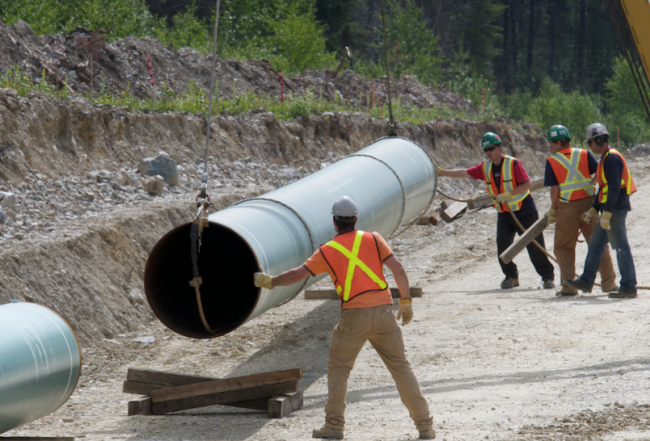Articles Menu

Mar. 19, 2021
While teachers, police officers and a host of other frontline workers will be among the first 322,000 British Columbians to receive vaccinations against COVID-19 outside of those in their age group – so too will those working on the Trans Mountain pipeline expansion project.
Doses totalling 15,000 will be immunizing workers at five industrial camps in the Northern Health region, while 6,500 doses will be administered in the Interior Health region to people working at three industrial workcamps, 34 food processing facilities and six farms or nurseries.
Trans Mountain is one of those industrial projects listed, along with the Site C dam, Rio Tinto Alcan, Coastal GasLink and LNG Canada.
Back in January, a public health order limited the number of people working on some of these industrial sites due to a rise in COVID-19 cases.
“There has been a rapid increase in the number of persons infected with COVID-19 associated with large scale industrial projects employing high numbers of workers,” provincial health officer Dr. Bonnie Henry wrote in her Dec. 29, 2020 order, specifically referencing projects in north and central B.C.
The move came nearly a month after Trans Mountain was censured by the Canada Energy Regulator for “systemic non-compliances” of COVID mask rules at its Lower Mainland worksites, including Burnaby.
Over the course of a three-day inspection, regulators found 37 instances of contractors not following COVID protocols. Four workers were sent home as a result of the inspections.
Premier John Horgan confirmed Thursday the province now expects to receive 340,000 doses of the AstraZeneca plc vaccine from both the Serum Institute of India and the COVAX sharing program by the end of May.
Horgan highlighted professions such as teachers, police, grocery workers and those working at food processing plants when making the announcement.
Child care staff, manufacturing workers, wholesale/warehousing workers, staff in congregate housing, staff at correctional facilities, those working in cross-border transport, quarantine officers, certain postal workers, bylaw officers and those working at outbreak sites are also being prioritized beginning — for the most part — in early April.
The province is selecting these workers based on concerns they’re in industries where full use of personal protective equipment and barriers can be challenging, outbreaks and clusters have occurred or are ongoing, and workers must live or work in congregate settings.
“We will also be focusing again on those higher risk industries,” Henry said during a media briefing.
There are 16,000 workers identified at 53 food-processing facilities, six industrial sites and five congregate housing sites that are being prioritized in the Vancouver Coastal Health region.
Thousands of temporary foreign workers — those typically living in communal housing on agricultural sites — will also be prioritized as they undergo isolation in Richmond hotels upon arriving in Canada.
“This allows us to really move ahead with this large shipment of vaccine to target these groups of people who we know are essential for keeping our community going, and who have been working throughout this pandemic,” Henry said.